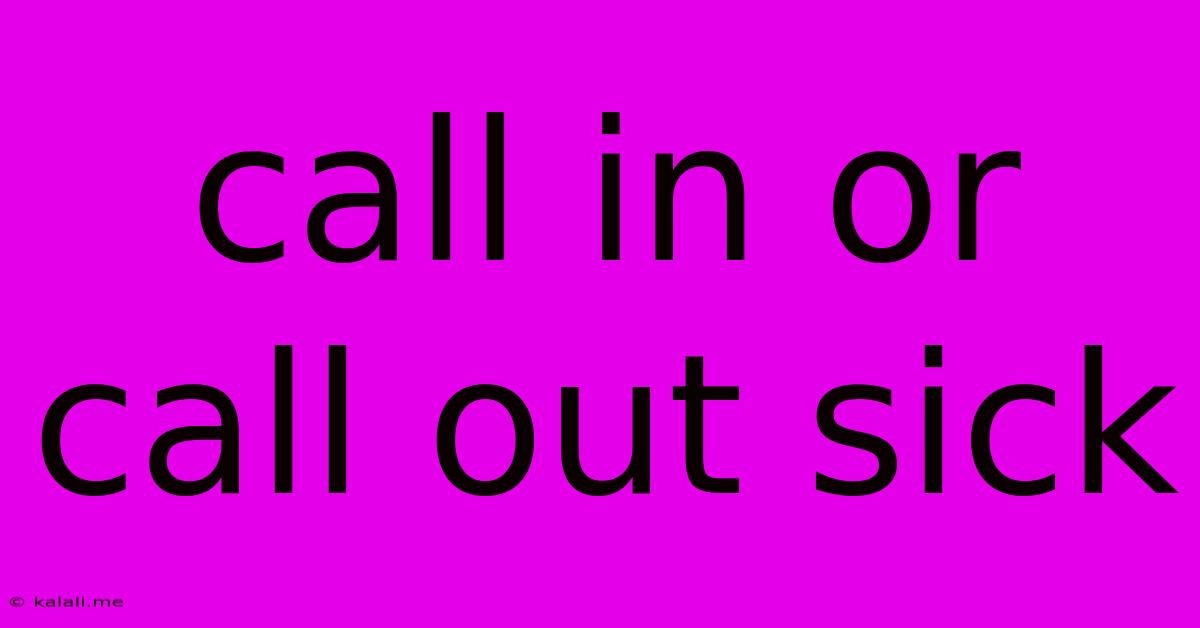Call In Or Call Out Sick
Kalali
May 24, 2025 · 3 min read

Table of Contents
Calling in Sick vs. Calling Out Sick: A Guide to Professional Absence
Meta Description: Learn the professional dos and don'ts of calling in or calling out sick from work. This guide covers appropriate communication, notifying your supervisor, and maintaining professionalism during an absence.
Calling in sick or calling out sick – are these phrases interchangeable? While often used synonymously, there are subtle nuances and professional implications to consider. This guide will explore the best practices for notifying your employer about an absence due to illness, emphasizing professionalism and effective communication.
Understanding the Nuances: "Calling In" vs. "Calling Out"
While both phrases indicate an absence due to illness, "calling in sick" often implies a more formal and proactive approach. It suggests a direct communication with your supervisor or designated contact, typically made before your scheduled start time. "Calling out sick," on the other hand, sometimes carries a slightly less formal connotation and might suggest a less planned or potentially abrupt notification.
However, in modern professional settings, the distinction is often blurred. The crucial aspect is how you communicate your absence, not the specific phrase used.
Best Practices for Reporting Illness
Regardless of whether you "call in" or "call out," follow these steps to ensure a professional and efficient notification:
- Notify your supervisor as early as possible: The earlier you inform your employer, the better they can manage your workload and cover your responsibilities. Ideally, do this before your scheduled start time.
- Be direct and concise: Clearly state that you are unable to come to work due to illness. Avoid excessive details about your symptoms unless specifically requested.
- Offer a brief explanation (optional): A simple statement like "I woke up feeling unwell" or "I've come down with a cold" is usually sufficient. Overly detailed descriptions are generally unnecessary.
- Specify your expected return date (if known): If you have a reasonable estimate of when you'll be back, include this in your message. If uncertain, indicate that you will update them as soon as possible.
- Check your company's policy: Familiarize yourself with your company's absence reporting procedures, including any specific forms or processes.
- Use the appropriate communication method: Follow your company’s preferred method of communication (phone call, email, company portal). A phone call is often preferred for urgent situations.
- Document your absence: Keep records of your sick days for your own personal reference, especially for tax purposes or future employment needs.
Maintaining Professionalism During Your Absence
Professionalism extends beyond simply notifying your employer; it also encompasses your actions while you are out sick.
- Respond to urgent communications (if possible): If you're able, briefly check emails or messages for urgent matters. However, prioritize your recovery.
- Avoid social media updates about your illness: Keep your health information private; it's not appropriate to discuss your sickness extensively on social media platforms.
- Return to work promptly: Get back to work as soon as you're able and feeling well enough to perform your duties effectively. Don't push yourself too hard, but aiming for a swift return shows your commitment.
Consequences of Improperly Calling Out Sick
Failing to notify your employer appropriately can have several negative consequences, including:
- Disciplinary action: Depending on company policy, this could range from a verbal warning to suspension or termination.
- Damage to your reputation: Repeated or poorly handled absences can negatively impact your professional reputation.
- Impact on team morale: Your absence can create extra work for your colleagues, potentially impacting team morale.
By following these guidelines, you can navigate calling in or calling out sick professionally and maintain positive relationships with your employer and colleagues. Remember that open and honest communication is key to managing absences effectively.
Latest Posts
Latest Posts
-
Do You Need An Id To Ride Greyhound Bus
May 24, 2025
-
How To Remove Dark Water Stains From Wood
May 24, 2025
-
Java To Use Saml Protocl To Consudmen Salesfroce Apis
May 24, 2025
-
Car Wont Start Without A Jump
May 24, 2025
-
Not Covered Or Basic And Simple
May 24, 2025
Related Post
Thank you for visiting our website which covers about Call In Or Call Out Sick . We hope the information provided has been useful to you. Feel free to contact us if you have any questions or need further assistance. See you next time and don't miss to bookmark.